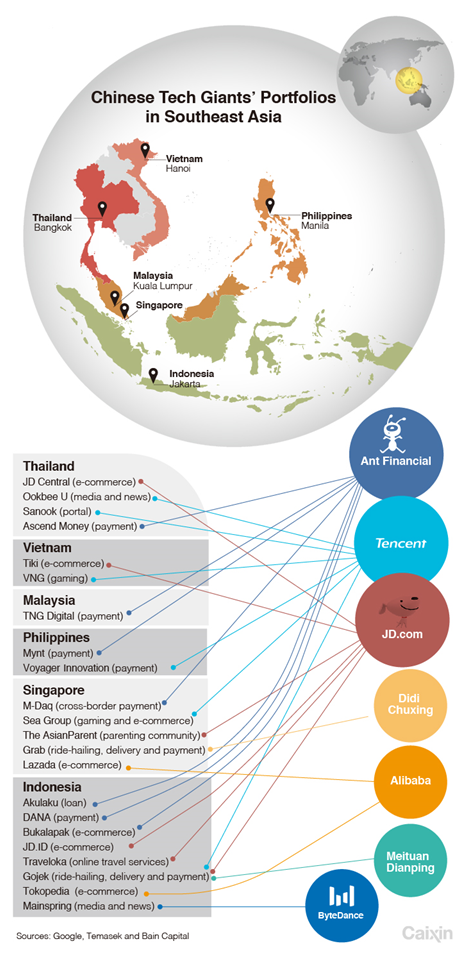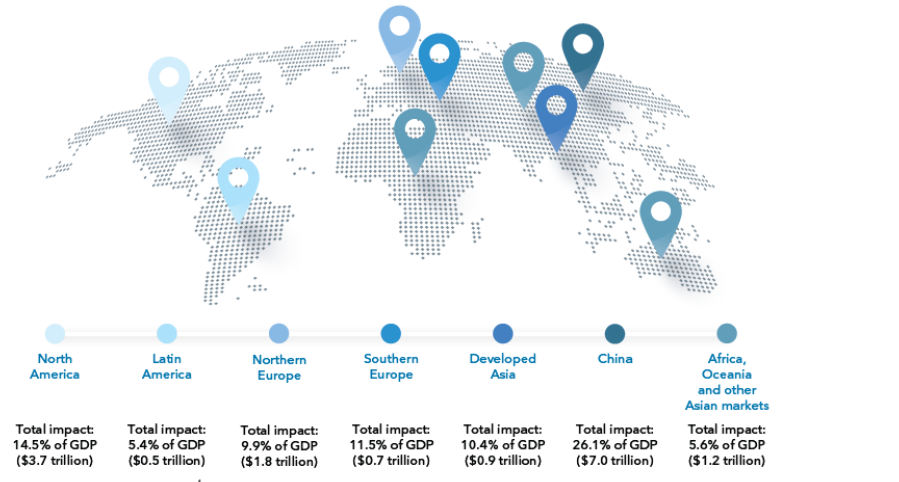Introduction
In the rapidly evolving landscape of technology and innovation, China has emerged as a powerhouse, asserting its influence and shaping the global tech revolution. With a combination of ambitious government policies, a booming startup culture, and a massive consumer market, China has become a formidable player in the tech industry. In this article, we delve into China’s remarkable journey from tech follower to tech innovator and its pivotal role in the ongoing global tech revolution.
In the fast-paced realm of technology and innovation, China’s rise as a tech powerhouse is nothing short of astonishing. Its journey from being a tech follower to a tech innovator has been a transformative narrative that has captured the attention of the world. This transformation has been propelled by a convergence of ambitious government policies, a thriving startup ecosystem, and a vast and voracious consumer market. In this article, we’ll delve deeper into the remarkable evolution of China’s tech landscape, shedding light on its pivotal role in shaping the ongoing global tech revolution.
Government Vision and Policy
At the heart of China’s tech ascendancy lies a strategic vision cultivated by the government. Over the past few decades, the Chinese government has recognized the importance of technology as a driver of economic growth and global influence. Consequently, it has devised a series of strategic plans and policies that encourage innovation, research and development, and the nurturing of tech talent. Initiatives like “Made in China 2025” and “Internet Plus” underscore China’s determination to become a world leader in key technological sectors such as artificial intelligence, 5G, and quantum computing.
The Thriving Startup Culture
China’s startup culture is another key ingredient in its tech success story. Cities like Beijing, Shanghai, and Shenzhen have become vibrant tech hubs, teeming with entrepreneurs, inventors, and investors. The country’s enormous population, coupled with a growing middle class with a penchant for tech-enabled services, has created fertile ground for startups to flourish. Tech giants like Tencent, Alibaba, and Huawei, which began as startups, have now become global giants that have reshaped industries from e-commerce and mobile payments to telecommunications.
Consumer Market and Innovation
China’s massive and increasingly affluent consumer market is a major driver of innovation. Companies are not only developing cutting-edge technologies but also deploying them at a breathtaking pace to meet consumer demands. The rapid adoption of mobile payment systems, the ubiquity of e-commerce, and the integration of technology into everyday life are striking examples of how China’s consumer market is pushing tech innovation to new heights.
Global Influence and Collaboration
China’s ascent as a tech innovator has also brought about a shift in the global tech landscape. Chinese companies are expanding their reach internationally, investing in startups and tech infrastructure abroad, and collaborating on global research projects. This global footprint is expanding China’s influence and fostering cross-border collaborations that have the potential to drive innovation on a global scale.
In conclusion, China’s transformation from a tech follower to a tech innovator is a compelling narrative that underscores the nation’s remarkable progress and determination. With its ambitious government policies, thriving startup culture, and a vast consumer market, China has become a formidable force in the tech industry, influencing global trends and shaping the future of technology. As the global tech revolution continues to unfold, China’s role in driving innovation and technological progress remains a central and dynamic force to watch.
For additional details, consider exploring the related content available here Research Futures 2.0 – A new look at the drivers and scenarios that …
China’s tech revolution did not happen overnight. It was the result of strategic planning, heavy investments, and a willingness to embrace change. The Chinese government played a significant role in fostering this transformation by creating an environment conducive to innovation. Initiatives like “Made in China 2025” aimed to boost domestic innovation and reduce the country’s dependence on foreign technology.
China’s tech revolution is a testament to the power of long-term vision and dedication. Through strategic planning, substantial investments, and a readiness to adapt, China has emerged as a global tech powerhouse. Central to this transformation has been the government’s commitment to innovation, exemplified by initiatives such as “Made in China 2025.” These efforts have not only bolstered domestic innovation but also propelled China to reduce reliance on foreign technology, driving its tech sector’s unprecedented growth.
Looking for more insights? You’ll find them right here in our extended coverage: Research Futures 2.0 – A new look at the drivers and scenarios that …

A vibrant startup culture has been a driving force behind China’s tech success. Cities like Beijing, Shanghai, and Shenzhen have become hotbeds of innovation, hosting a multitude of tech startups working on everything from e-commerce to artificial intelligence (AI). The Chinese government’s support for incubators and technology parks has provided fertile ground for entrepreneurs to turn their ideas into reality.
China’s startup ecosystem is a dynamic playground for entrepreneurs, investors, and tech enthusiasts alike. With a thriving spirit of innovation, these startups are disrupting industries, creating jobs, and pushing the boundaries of technology. As they continue to receive support from venture capitalists, accelerators, and government initiatives, China’s startup scene is set to scale even greater heights. So, whether you’re a budding entrepreneur or simply curious about the future of technology, keeping an eye on China’s vibrant startup culture is a journey worth embarking on.
You can also read more about this here: Global technology innovation hubs

China’s tech prowess is perhaps most visible in the e-commerce sector. Companies like Alibaba and JD.com have not only revolutionized the way people shop but have also expanded their reach globally. Alibaba’s Singles’ Day, the world’s largest online shopping event, is a testament to China’s e-commerce dominance.
China’s technological prowess is undeniably impressive, and nowhere is it more visible than in the dynamic landscape of e-commerce. Companies like Alibaba and JD.com have not merely transformed the way people shop; they’ve also orchestrated a global expansion that reshapes the contours of international trade. One iconic event that showcases China’s e-commerce dominance is Alibaba’s Singles’ Day, an annual shopping extravaganza that stands as a testament to their incredible influence on the world stage.
Alibaba, often hailed as the Amazon of China, has taken the concept of online shopping to new heights. What began as a humble e-commerce platform has grown into a colossal ecosystem that encompasses not only online retail but also cloud computing, digital entertainment, logistics, and more. Alibaba’s innovative approach to blending online and offline experiences through ventures like Hema supermarkets and the acquisition of leading retail chains has redefined the retail landscape, creating a seamless fusion of the virtual and physical realms.
JD.com, another e-commerce giant, has similarly left an indelible mark on the global retail landscape. Known for its commitment to delivering products with unprecedented speed and reliability through its extensive logistics network, JD.com has become a paragon of efficiency in the e-commerce world. Its innovative use of technology, including drone deliveries and autonomous vehicles, has set a benchmark for the industry.
One shining jewel in China’s e-commerce crown is Alibaba’s Singles’ Day, a shopping phenomenon that has transcended national borders to become the world’s largest online shopping event. What started as an anti-Valentine’s Day celebration for singles has evolved into a colossal retail extravaganza. On this day, millions of shoppers from all corners of the globe flock to online platforms, snapping up everything from consumer electronics to fashion, home goods, and more. The scale of Singles’ Day is mind-boggling, with sales surpassing those of Black Friday and Cyber Monday combined.
Moreover, Singles’ Day has become a showcase for innovation, with Alibaba employing cutting-edge technologies like augmented reality, virtual reality, and livestreaming to engage consumers. It’s not just a shopping spree; it’s a full-blown entertainment and cultural event that captivates the world’s attention.
China’s e-commerce giants, Alibaba and JD.com, are emblematic of the country’s technological prowess and its ability to seize opportunities in the digital age. Their relentless pursuit of innovation, customer-centric approach, and global expansion efforts continue to reshape the global retail landscape. As they push the boundaries of what’s possible in e-commerce, the world watches with fascination, knowing that China’s influence in this sector is not only profound but also transformative.
Additionally, you can find further information on this topic by visiting this page: Flexport unveils e-commerce tools as returned CEO aims to regain …

China has also made significant strides in the fields of artificial intelligence and big data. Companies like Baidu, Tencent, and Huawei are at the forefront of AI research and development. From facial recognition to autonomous vehicles, China is driving innovation and pushing the boundaries of what technology can achieve.
China’s advancements in artificial intelligence (AI) and big data are not only reshaping industries but also transforming daily life. AI-powered applications are becoming increasingly integrated into various aspects of Chinese society, from healthcare and education to transportation and entertainment. These technologies are not just about innovation; they are also enhancing efficiency, convenience, and the overall quality of life for Chinese citizens. As China continues to lead the way in AI and big data, the world watches closely to see how these advancements will shape the future of technology and society on a global scale.
Explore this link for a more extensive examination of the topic: Understanding the adoption of Industry 4.0 technologies in …

Chinese tech companies are not content with dominating the domestic market; they are expanding globally. Huawei, despite facing challenges, has become a major player in the global telecommunications industry. Chinese tech giants are investing in research centers and partnerships worldwide, solidifying their presence on the international stage.
Chinese tech companies are not content with dominating the domestic market; they are expanding globally. Huawei, despite facing challenges, has become a major player in the global telecommunications industry. Chinese tech giants are investing in research centers and partnerships worldwide, solidifying their presence on the international stage. This global expansion not only strengthens their position but also introduces innovative technologies and products to a broader audience, fostering international collaboration and competition in the tech sector.
You can also read more about this here: China’s Glo.bal Influence:

China’s tech rise has not been without its fair share of controversies. Concerns about data privacy, intellectual property theft, and state surveillance have raised red flags for some. Additionally, the geopolitical tensions between China and other nations have added complexity to the global tech landscape.
China’s rapid ascent in the tech industry undeniably captivates the world, but it’s a journey marked by both triumphs and tribulations. The global stage has witnessed the emergence of Chinese tech giants like Huawei, Tencent, and Alibaba, showcasing remarkable innovations that span from cutting-edge artificial intelligence to e-commerce revolutions. However, behind this meteoric rise lies a shadow of concerns that demand thoughtful consideration.
Data privacy issues have been at the forefront of these concerns. With the vast troves of personal data generated by the digital age, questions arise about how this information is handled, stored, and accessed by both private companies and the government. The potential for misuse or breaches raises legitimate apprehensions among users and global stakeholders.
Intellectual property theft is another thorny issue. While China has made substantial progress in strengthening intellectual property rights, cases of infringement and counterfeiting still exist. This poses challenges for foreign companies looking to engage with Chinese markets and collaborate with Chinese partners.
State surveillance, often intertwined with issues of data privacy, has also fueled unease. China’s extensive surveillance apparatus, sometimes referred to as the “Great Firewall” or the “social credit system,” raises questions about personal freedoms and privacy rights in a digital age. The balance between national security and individual liberties remains a contentious topic both within China and on the global stage.
Moreover, the geopolitical tensions between China and other nations have cast a complex shadow over the global tech landscape. Trade disputes and national security concerns have led to restrictions on the export of certain technologies, creating a web of regulations and tariffs that influence international tech collaborations and supply chains.
In navigating this intricate landscape, it’s essential to recognize that China’s tech rise is not just a national phenomenon but a global one. Understanding and addressing these concerns requires open dialogue, cooperation, and the development of common standards and norms. It’s a challenge that transcends borders and demands the collective effort of the international community to strike a balance between harnessing the benefits of technological advancement and safeguarding fundamental values and rights.
If you’d like to dive deeper into this subject, there’s more to discover on this page: Research Futures 2.0 – A new look at the drivers and scenarios that …

China’s role in the global tech revolution is undeniable. The nation has transitioned from being a follower to a trailblazer, driving innovation across various tech sectors. With a vast market, a hunger for innovation, and a commitment to research and development, China is poised to continue shaping the future of technology on a global scale. However, it must also navigate challenges and address concerns to maintain its position as a tech titan of the East. The world watches closely as China’s tech journey unfolds, knowing that it will play a pivotal role in the ever-evolving world of technology and innovation.
“As China continues to drive innovation across various tech sectors, its influence on the global tech revolution is undeniable. With a vast market, commitment to R&D, and a hunger for innovation, China is poised to shape the future of technology worldwide. However, it must address challenges to maintain its position as a tech titan in the East.”
Should you desire more in-depth information, it’s available for your perusal on this page: Stories From Tomorrow: exploring new technology through useful …
More links
Looking for more insights? You’ll find them right here in our extended coverage: Research Futures 2.0 – A new look at the drivers and scenarios that …
